 Web Content Display
Web Content Display
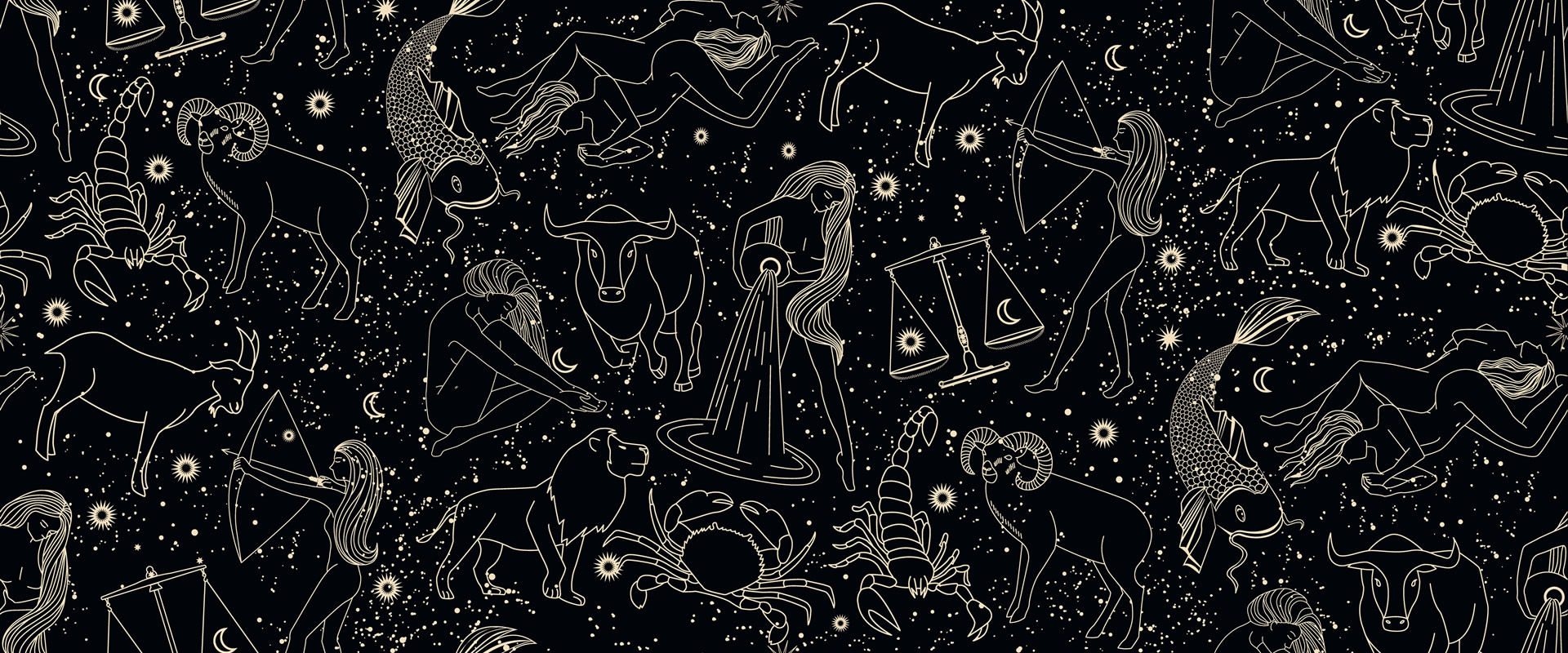
Constellations and Myths
Tab Menu
 Web Content Display
Web Content Display
People may say Chinese are realistic. Or they may say ancient Chinese treated the heavens as a miniature of their earthly world. These comments may be reasonable since most of the 306 asterisms are related to the feudal society and everyday utensils. However, it does not mean there are no touching myths and legends in the Chinese sky. For instance, generations of Chinese have been moved by the story of Cowherd (Altair) and Weaving Girl (Vega). Poets and writers never cease to create masterpieces describing this romantic tragedy.
Let's wander into the fantasy world of the Chinese Starlore!
 Web Content Display
Web Content Display
Legends of the Origin of Heaven and Earth
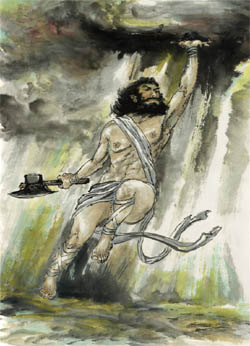
Before the separation of the sky and the earth, the universe was in a nebulous state and shaped like an egg. Pan Gu came into existence and grew taller, one day by ten feet. Meanwhile, the sky rose ten feet and the earth thickened by the same amount everyday. This continued for 18,000 years until the sky and the earth were completely separated. But Pan Gu died at the end too. Upon his death, his body transformed into various things in the world. His breath became winds and clouds, his voice thunder and lightning, his left eye the sun, and his right eye the moon; his arms and legs the four poles of the earth and the five parts of his body the five mountains; his blood formed the rivers and his veins the roads; his flesh and skin became the soil of the fields and his hair and moustache the stars; the fine hair on his skin turned into grass and trees, his teeth and bones metals and rocks; his marrow changed to pearls and jade, and his sweat fell as rain that nourished all things; the insects on his body, caressed by the winds, took the shape of men and women.
Another version was that Pan Gu was born amidst chaos. He stretched his body and lifted the lighter substances to form the sky, and stepped on the heavier ones to form the ground. He hacked those clinging matters with an axe, and finally separated the sky from the earth.
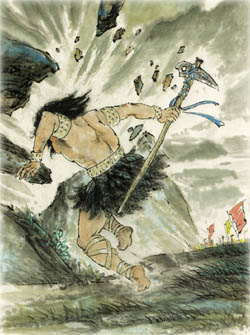
Long time ago Gonggong and Huangdi fought with each other and Gonggong was defeated. Angered, he smote and broke the celestial pillar, Unrotating Mountain. The bonds with the earth were thus ruptured. Heaven leaned over to the northwest, the Sun, Moon, stars and planets shifted, and the earth became empty in the southeast, which was why all the rivers flowed to the east.
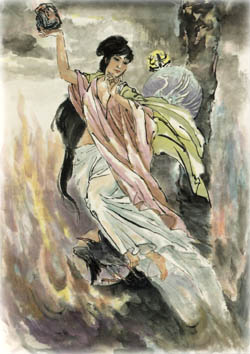
When the celestial pillar was broken, the sky and the earth were in chaos again. The sky could not cover all the things under it, nor could the earth carry all the things on it. While some places were tortured by fire, some places were plagued by floods. And the land was infested with monsters. Saddened by the suffering of the living things, Nuwa melted the stones of five colours to mend the sky. She cut a foot off a turtle as the new celestial pillar. She also slew the black dragon that troubled the country. Finally, she piled up the soil to stop the overflowing waters and everything was at peace again.
 Web Content Display
Web Content Display
Legends of the Time and Seasons
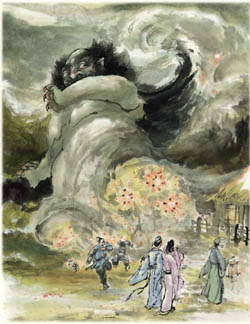
It was said that a monster called "Year" existed in ancient times. It hibernated at the bottom of the sea and woke up only on the last day of a year. When it came ashore, it would bring floods. As it would eat anything it encountered, villagers were afraid of it. Then a fairy gave them hints. They learned that Year was afraid of red colour and noise. Since then, people put up red paper and set off firecrackers during New Year.
 Web Content Display
Web Content Display
Legends of the Sun and the Moon
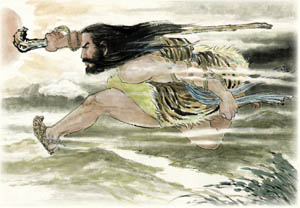
Long ago a giant called Kua Fu had a crazy idea of racing with the Sun. During the race, he was very thirsty and drank all the water in the Yellow River and the Hui River. But eventually he was exhausted and died. His stick became a field of peach forest extending thousands of miles.
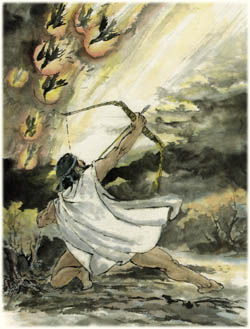
Chinese believed that there were ten Suns in the sky long time ago. But they would only take turns to give sunshine to the people on earth. One day, the Suns got sick of taking turns and came out together. As a result the Earth was scorched. Emperor Yao pleaded with the governor of the sky, Emperor Jun to restrain his sons from appearing at the same time. However, they refused to listen to their father. Emperor Yao had no choice but to send Hou Yi to threaten them with a bow and arrows. But Hou Yi overdid and shot nine of them down. Losing his sons, Emperor Jun's was angry and banished Hou Yi to the Earth from Heaven.
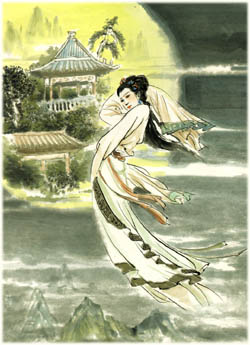
After shooting down nine Suns, Hou Yi and his wife Chang'e were banished to the earth from heaven. But they still longed for returning. Later, Hou Yi learned that the Queen of the West had elixir of immortality. Upon his visit, the Queen was sympathetic with his misfortune. She gave him the elixir and told him, "If you and your wife share the elixir, both of you will live forever. If one consumes all the elixir, he will even rise up to Heaven and become a god." A greedy thought budded in Chang'e's mind when she realized the power of the philosopher's stone. She stole all the elixir and took them herself. Feeling ashamed and to hide from sneers from other fairies, she flew to the Moon and lived there alone and became the Goddess of Moon.
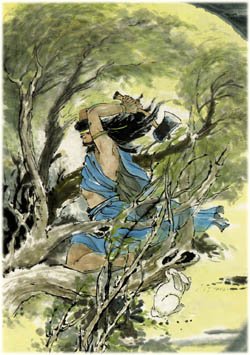
Once upon a time, there was a young man named Wu Gang who left home to study Taoism. When he returned home three years later, he found that his wife, Yun, and the grandson of Emperor Yan called Boling had an adulterous relationship. They even had three children. Blinded by the anger, he went to Boling to take revenge and brutally killed him. Emperor Yan was enraged by that and he sent Wu Gang to the Moon to chop the ever-growing bay tree as a punishment. The tree was 5000 feet tall and could heal itself immediately after each cut. So Wu Gang became a life-long tree chopper and never had a chance to rest.
Yun was sorry for her husband and ordered her three children named Gu (a toad), Shu (a rabbit) and Yan to keep company with their 'father' on the Moon. That explains why there are a toad and a rabbit on the Moon.
 Web Content Display
Web Content Display
Legends of Planets
There is a famous Chinese saying "conducting construction works on the head of Taisui" which is used to describe the extreme folly of offending the powerful. Though the idiom is popular, few Chinese really know who Taisui is. They only know it is the most cruel and horrible god.
The origin of Taisui is related to Jupiter, which was used as a celestial marker to name a year in ancient China. As the orbital period for Jupiter is about 12 years, ancient Chinese accordingly divided the sky into 12 divisions. Jupiter passed one division every year and that year would be called after the name of the division it stayed. Other than the 12 divisions, there are 12 chen (called by the names of 12 Terrestrial Branches: zi, chou, yin, mao, chen, si, wu, wei, shen, you, xu and hai). The order of 12 chen is from east to west, which is opposite to the direction of Jupiter's movement. As the 12 Terrestrial Branches were more popular to Chinese then, they eventually used chen to name the year instead. Ancient Chinese fabricated a celestial body, which also revolved the sky once every 12 years. But the direction was opposite to that of the Jupiter. This imaginary celestial body was called Taisui. Once the initial positions of Jupiter and Taisui were set, the corresponding chen could be easily derived from the actual division where Jupiter stayed in that year.
As 12 Terrestrial Branches were also used to indicate directions, Chinese believed that Taisui would occupy a specific direction every year. Since the Western Han Dynasty, people believed that the direction where Taisui stayed was unlucky. If someone started a construction work in that direction, he would dig out a horrible piece of moving flesh and something terrible would happen to him. So one should not "conduct construction works on the head of Taisui".
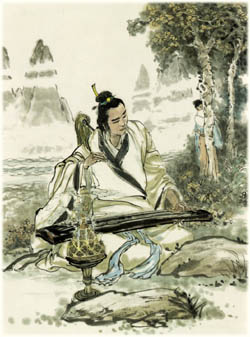
It was said that a fairy named Huang'e was responsible for weaving in Heaven. One day, when she was tired of her work, she paddled out to the Celestial River (the Milky Way). She went up-stream to the coast of Western Sea and took rest under a mulberry tree. Venus in the east saw her and transformed himself into a handsome young man singing and playing instrument by the riverside of the Celestial River. They fell in love and had a son called Shaohao. When he grew up, he set up a nation and named it after himself.
Moreover, in the book of Journey to the West, Venus was a fairy from Heaven. When the Monkey King was causing trouble to the East Sea and the Hell, Venus was the one sent by the Celestial Emperor to calm him. But the Venus in this novel is described as an old man, no longer young.
 Web Content Display
Web Content Display
Legends of Chinese Asterisms
The second star of Xin (Antares, α Scorpii) is a red giant that represents the heart of Scorpius. The Heart mansion is also called the Shang star. For more information about the story of these stars, see "Three Stars" below.
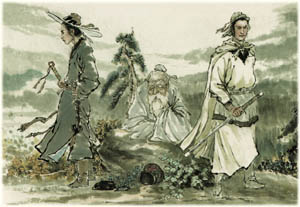
Shen is also called Shichen. In Chinese legend, Shichen was the younger son of an emperor named Gaoxinshi. He was always fighting with his elder brother Ebo. The situation was so desperate that his father had no choice but to separate them. Ebo was moved to Shangqiu and was responsible for sacrifices to the Shang star (Heart mansion), while Shichen was moved to Daxia and was responsible for the sacrifices to Shen. These two lunar mansions were just like the brothers, who lived far away from each other and never met.
The sixth star of this asterism is called Silu, an officer responsible for promotion and salary. Silu is worshiped as the god of honor in ancient China. This star was personified and connected to a fabricated character named Zhang Xian. One version said that Zhang Xian was a Taoist priest who attained the Taoist wisdom and became immortal in the Five Dynasties (907-960 AD). Another version is more interesting. It was said that the previous incarnation of Zhang Xian was Meng Chang, a king of a small nation in Sichuan during the Five Dynasties. He was famous for his immoral and extravagant way of living. Even his chamber pot was made of gold and decorated with pearls and precious stones. Later on, He was defeated by Zhao Kuang-yin, the first emperor of the Song Dynasty (960-1279 AD). When Emperor Zhao saw the luxurious chamber pot, he was amazed and said, "A king indulging in pleasure like that should doom." After the defeat, Meng Chang and his most beloved concubine, Lady Pistil, was kept captive in the capital of the Song Dynasty, Kaifeng. It was not long before Meng Chang was killed. In memory of his husband, Lady Pistil painted a portrait of Meng Chang in secret. One day, emperor Zhao visited her and discovered the painting. He unhappily asked who the man was. Desperately in search of an excuse, she lied that it was only a painting of a Taoist immortal named Zhang Xian, a popular god worshipped in Sichuan. Whoever offering sacrifice to the god would be granted a son. As such, Meng Chang was turned into a god for no reason. Because of this legend, the god of honor was always depicted to be a Chinese senior official holding a little child.
The asterism Wenchang is also worshiped by Taoist priests as god of official honor and promotion. It was said that, during the Jin Dynasty (265-420AD), Zhang Ya-zi, an official who was famous for his filial piety deeds, died in a battle. In honor of his virtue, people build a temple and gave offerings to him. In the Song (960-1279 AD) and Yuan (1280-1368 AD) dynasties, Taoist priests began to fabricate a whole series of previous incarnation stories to him. It was also said that he was appointed by the Jade Emperor of Heaven to hold the celestial administrative office and govern the official honor and promotion on Earth. In a typical Wenchang temple, you will find the god served by two boy attendances, namely Tianlong (which means born deaf) and Diya (which means born mute). Since the god Wenchang governs the official honor and promotion, it is utmost important to keep the decree of god in secret. He intentionally uses two handicapped boys so that the one can hear the secret cannot speak, while the one can speak cannot hear.
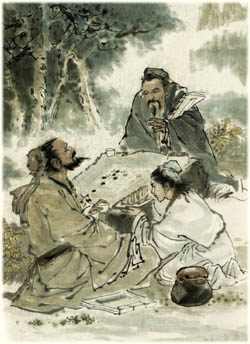
This asterism is also called Southern Dipper. It was said that, in the Period of Three Kingdoms (220-280), there was a famous Taoist priest named Guan Lu. Once day he met a young man named Yan Chao. As an expert in physiognomy, he found the young man would die soon and told the man his ill fortune. At the time, Yan Chao was only nineteen and was really upset by the bad news. He begged the priest to help him. Guan Lu instructed, "You should go home fast and prepare a bottle of good wine and a plate of deer meat. Then go to the south of the wheat fields. Under a giant mulberry tree, you will find two old men playing chess. Serve them well and don't say a word. They may help you." Following the instruction, Yan Chao finally found the old men as described. He stood beside still and served them with wine and meat silently. Being too concentrated on the game, they enjoyed the feast subconsciously. After some time, the old men to the North suddenly noticed the present of Yan Chao and annoyingly said, "What are you doing here?" Without saying a word, Yan Chao fell on his knees and kowtowed. Didn't know how to deal with the young man, the old man finally said, "we've enjoyed his offerings. Let's do something to reward him." The old man to the South said, "Give me your record of death." When he found that Yan Chao was destined to live only nineteen years, he crossed the record out and changed it into ninety. Delighted with unexpected good result, Yan Chao thanked the old men and went home. Afterwards, Guan Lu explained, "the old man sitting to the North is Northern Dipper, the one to the South is Southern Dipper. Southern Dipper is responsible for the birth and Northern Dipper is responsible for the death."
This Chinese asterism is more commonly known as Big Dipper. The names of the seven stars are: Celestial Pivot, Celestial Rotating Jade, Celestial Shining Pearl, Celestial Balance, Jade Sighting Tube, Opener of Heat and Twinkling Brilliance. There is a small asterism called Assistant (Fu) which belongs to Northern Dipper. The seven stars were later worshipped by Taoists as gods. The Chinese always has a saying that "The Southern Dipper marks life and the Northern Dipper marks death." See "Dipper".
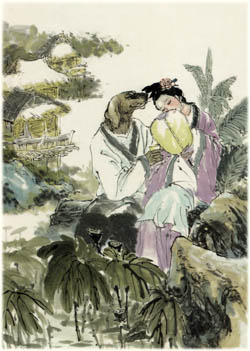
Gouguo may be a fabled nation in Chinese mythology. In Emperor Gaoxin's time, a powerful tribe called Quanrong was mounting frequent attacks on the frontier areas. Worried about the situation, the emperor appealed to the whole country, saying that he would reward anyone who could bring him the head of the tribe's chieftain with his own daughter and a fief with 300 households. The emperor's dog Panhu left without a sign. After three months, it ran into the palace, holding the head of the tribe's chieftain. To keep his promise, the emperor married his daughter to the dog and granted an island in the southeast as the feudal land of Panhu. The new nation was called Nation of Dogs. In this fabled nation, all men are dogs and all women are beautiful girls.
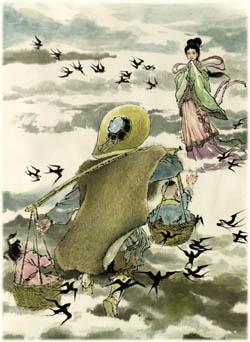
The second star of Hegu (α Aquilae, Atair) is the star Cowherd. The two dimmer stars on each side are the sons of Cowherd carried by a pole on his shoulder. According to legend, Cowherd's wife, Weaving Girl, was the granddaughter of the celestial emperor. She worked hard year in year out, weaving colourful brocade for the gods and goddesses. However, she stopped weaving after she married Cowherd. Outraged, the celestial emperor ordered the couple to be separated by the celestial river and only allowed them to meet once a year. On the seventh day of the seventh lunar month, the magpies would spread their wings together to form a bridge, enabling the tragic lovers in heaven to meet that night. In the Chinese sky, Hegu can mean a drum at the river.
The first star of Zhinu (α Lyrae, Vega) is the famous star Weaving Girl. The asterism is also called Celestial Granddaughter since, according to legend, Weaving Girl was the granddaughter of the celestial emperor (see "Drum at the River" above).
The second brightest star in the sky, Laoren is known as Canopus in the Western constellation. For the ancient Chinese, this star was so close to the southern horizon that it could only be seen for a short period of time. Since its appearance would bring peace and prosperity, there were temples specially dedicated to this star. In many Chinese families, you can find a statue of the God of Longevity, the humanized figure of the Laoren star.
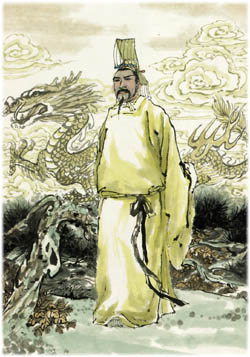
The star A Leonis is also known as Maids-in-waiting, and in some documents it was regarded as a subordinate asterism of Xuanyuan. Xuanyuan is the name of the Yellow Emperor, who, according to folklore, was elected to be the common leader of the tribes after the defeat of Emperor Yan and the killing of the rival chief Chiyou. This united tribe finally developed into the Chinese nation. Chinese people call themselves the descendants of Yellow Emperor, in memory of Xuanyuan.
In ancient China, the sky was divided into 31 regions called three enclosures and 28 lunar mansions. The three enclosures, which mean three walled regions, are the Purple Palace Enclosure, the Supreme Palace Enclosure and the Heavenly Market Enclosure. The 28 lunar mansions, meanwhile, are similar to the 12 signs of the zodiac in the West. They are regions near the ecliptic and the celestial equator, where the Sun, the Moon and the planets pass by. Astronomers believe that lunar mansions are related to the Moon's 271/3 days sidereal period, which is the time it takes to complete one revolution in its circular path on the celestial sphere. The 28 lunar mansions can be grouped into the Four Images - the Azure Dragon to the East, the White Tiger to the West, the Vermillon Bird to the South and the Murky Warrior to the North. Later, the Taoists deified the Murky Warrior to become an important god.
As to the birth of the Murky Warrior, some literatures say that it existed when the Universe was created. In the time of Yellow Emperor, it was reincarnated as the son of a queen in the Country of Jing Le. He stayed in his mother's womb for 14 months, and came out from her left armpit at birth. In legend, it was said that when he was fourteen years old, he went out the palace to enjoy the lantern festival. Disappointed by human's forever vices - wealth, pornography, liquors and pride, he abandoned the throne and went to Mountain Wu Dang to practice Taoism. When he attained the Taoist wisdom and became immortal, he was ordered by the Heavenly Emperor to guard the North.
